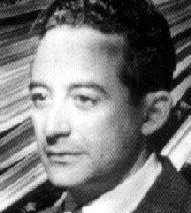Xavier Villaurrutia y González (27 March 1903 – 25 December 1950) was a Mexican poet, playwright, translator, and literary critic whose most famous works are the short theatrical dramas called Autos profanos, compiled in the work Poesía y teatro completos, published in 1953.

Biography edit
Xavier Villaurrutia was born in Mexico City in 1903. He studied in the Escuela Nacional Preparatoria (National Preparatory School) and in the Escuela de Jurisprudencia (Jurisprudence School). During that time, he felt a certain affinity to writing so he decided to dedicate his life to writing literature.
In 1928, he joined the grupo de los Contemporáneos (Contemporaries). In 1935, he received a scholarship from the Rockefeller Foundation to study theatre at Yale University.[1] Returning to Mexico in 1937, he started working for the local newspaper, Letras de Mexico. Villaurrutia would later found the first experimental theater in Mexico.
Along with Salvador Novo, they founded the magazine Ulises in 1927, in which he published the novel Dama de corazones (Lady of hearts) in 1928.[2]
Notable works edit
Villaurrutia's notable works include his poetic writings, beginning with Reflejos in 1926 and Nocturnos in 1933. Villaurrutia's writing becomes darker in his later poetic works: Nostalgia de la muerte (literally meaning "Nostalgia of death") in 1938, and Décima muerte (literally "tenth death") in 1941. It is unclear if this change was due to the increased turmoil in Europe that would lead to World War II or simply due to Villaurrutia's increasing age. The preoccupation with death in Villaurrutia's work climaxed with his 1941 play, Invitación à la muerte, the title of which can be literally translated to "Invitation to the death" (see "References" below regarding Dr. Raymond Marion Watkins's book which chronicles a history and analysis of this play, which Watkins demonstrates was heavily influenced by Villaurrutia's integration of dramatic elements traceable to William Shakespeare's "Hamlet.") The final published work of Villaurrutia came posthumously in 1953 with the publication of Poesía y teatro completos, a collection of his works which included the short theatrical dramas, Autos profanos. The American writer Eliot Weinberger translated Nostalgia de la muerte to English.[3]
Critical analysis edit
Xavier Villaurrutia was greatly influenced by the work of Ramón López Velarde as well as by several other Mexican poets.
Legacy edit
He has been a major influence for many poets, including Octavio Paz (who was his student) and Alí Chumacero.
Since 1955, there has been a Xavier Villaurrutia Award for literary works published in Mexico, selected by a jury of writers. This award has been sponsored by the Consejo Nacional para la Cultura y las Artes since 1991.[4]
References edit
- ^ "Xavier Villaurrutia, eterno poeta nocturno". Secretaria de Cultura (in Spanish). 27 March 2020. Archived from the original on 2023-07-13. Retrieved 2023-07-13.
- ^ Beck, Vera F. (1952-12-16). "Xavier Villaurrutia, dramaturgo moderno". Revista Iberoamericana. 18 (35): 27–39. doi:10.5195/reviberoamer.1952.1481. ISSN 2154-4794.
- ^ Villaurrutia, Xavier (1993). Nostalgia for Death: Poetry. Port Townsend, Washington: Copper Canyon Press. ISBN 978-1-55659-053-5.
- ^ El Premio Xavier Villaurrutia Archived January 9, 2007, at the Wayback Machine - in Spanish
Links edit
- The Columbia Electronic Encyclopedia, 6th ed.
- Christopher Ramirez (16 June 2005). "Mapping the Public Space of '(Homo)sexual' Latino Men: Essay". University of California, Santa Cruz. Archived from the original on July 13, 2007. Retrieved 2007-04-03.
- For more information on Villaurrutia's "Invitación a la Muerte," see Dr. Raymond Marion Watkins's From Elsinore to Mexico City: The Pervasiveness of Shakespeare's Hamlet in Xavier Villaurrutia's Invitación à la Muerte—published in Saarbrücken, Germany, by VDM Verlag, 2008. Dr. Watkins's book also includes extensive documentation of Villaurrutia's study at Yale University's Drama School from 1935–36, the only time Villaurrutia left his native Mexico City.